Electric car batteries: everything you need to know
► Electric car battery tech explained
► Your guide to the latest EV batteries
► Capacity, cost, dangers, lifespan
Electric cars are increasingly looking like the future of motoring, which means we’re all going to have to get used to battery technology. If you don’t know your kilowatts from your kilowatt-hours it can be daunting at first, but it really doesn’t take long to master the jargon.
In this useful guide, we’ll explain how electric car batteries work, what to look for when buying an EV (electric vehicle), and how to identify cutting-edge battery tech against the stuff that’s already followed Betamax and floppy disks into the dustbin of history.
Are hydrogen fuel-cell cars the future?
Mục Lục
What kind of batteries do electric cars use?
Most new electric cars on sale today use battery tech that’s fundamentally the same: hundreds of individual cells packed into modules of pockets to make one large battery. The biggest ones are massive, measuring a few metres long and weighing several hundred kilos; this is why most are placed under the floor inside a car’s chassis in what’s sometimes called a skateboard configuration.
“It’s important to differentiate,” explains former Tesla and now Lucid CEO Peter Rawlinson. “The small, individual elements are the cells – the finished unit is the battery.” They’re bundled together into a battery unit, which is conditioned to maintain an optimum operating temperature regardless of the summer or winter climate outside, as shown in our diagram below.
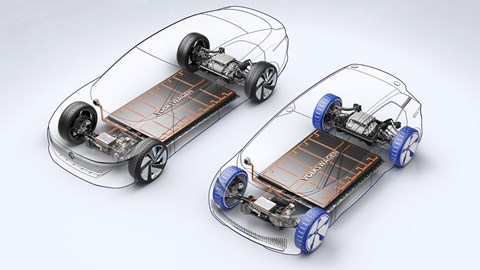
There are two main types of electric car battery commonly used today:
- Lithium-ion battery Used by most EV makers (eg Tesla, Jaguar)
- Nickel-metal hydride Seen in hybrids (eg Toyota)
The underlying chemistry isn’t that different to the batteries in your mobile. Most modern smartphones use lithium-ion batteries for quick charge cycling – this is what you’d find in an Apple iPhone or Samsung Galaxy mobile, just deployed on a giant scale.
Requirements are complex: they need to be able to store a lot of energy, but also recharge quickly, and retain their energy density over many thousands of charging cycles, all the while being pummeled by roads, potholes and whatever the great British weather throws at them…
Stepping stone electric cars: our guide to the best hybrids on sale today
Non EV – The Best Car Battery Chargers
EV – The Best Car Battery Chargers
Electric car battery capacity
To provide the energy required to propel a car weighing two tonnes and upwards, EV batteries are generally pretty large. Their energy capacity is normally measured in kilowatt-hours (or kWh), denoting the battery’s energy storage over a specific time. You can think of this as the size of a fuel tank in a combustion-engined vehicle.
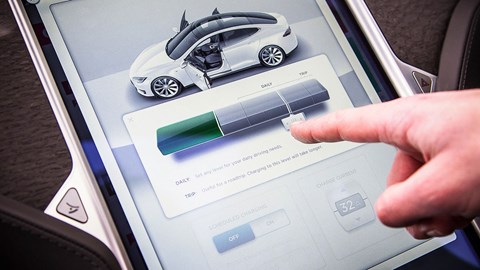
So a 100kWh battery in a Tesla Model S (above) is capable of delivering a maximum of 100 kilowatts of energy for one hour straight. Typical day-to-day driving will use considerably less energy than that, so in fact the battery will last for several hours before needing to be recharged.
These electric articles might be useful
How long do batteries in electric cars last?
If you’re considering an EV, it’s important you pick a car with a battery capacity big enough to suit your needs. If most of your driving is short hops or school runs around town, a smaller battery capacity will be fine.
A new breed of small electric cars, such as the Honda E, are arriving with relatively puny battery capacities. The Honda has a small 35kWh battery, enough for around 130 miles of range. That should be sufficient if you live in town, but many will want more range, which is why Jaguar equips its i-Pace with an 85kWh battery for a 292-mile claimed range.
CAR lives with the Jaguar i-Pace: our long-term test
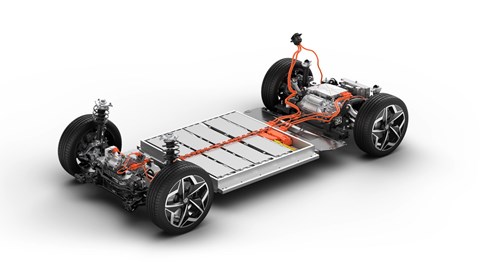
It’s very simple: the more range you need, the bigger the battery pack you should specify – or accept you’ll need to charge up more frequently.
The smallest batteries today are around 30-something kWh, whereas the largest range up to 100kWh. Tellingly, the price of the larger batteries is significant. Our advice is not to be scared off by the smaller capacities, so long as you have home charging and a modest commute.
Longevity, reliability and warranties
How long an EV battery lasts isn’t just a question of daily range, of course. Some buyers are worried about how long the battery itself will last – but all the evidence suggests that your car will not suffer a catastrophic battery death like your ageing mobile phone might.
There are so many cells in a typical EV battery that they retain capacity even after hundreds of thousands of miles; although they won’t perform as well as when box-fresh and new, they will keep holding charge for many, many years to come and the internet is full of high-mileage electric and hybrid cars still working well into their dotage. The expected electric car battery life is at least a decade and our advice is your car will fall apart before your battery fails.
We drive the 100,000-mile old Tesla
This is why all new electric cars on sale today come with long warranties, guaranteeing around 70% original capacity even after seven or eight years’ use:
- BMW i3 Eight years/100,000 miles
- Hyundai Kona Electric Eight years/100,000 miles
- Kia e-Niro Seven years/100,000 miles
- Jaguar i-Pace Eight years/100,000 miles
- Nissan Leaf (below) Eight years/100,000 miles
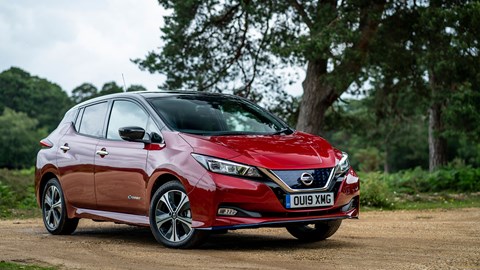
It’s also why residual values of EVs has risen in recent years, as the market clocks on to how an ageing first-gen Nissan Leaf is still a great buy.
Why are electric car batteries so expensive?
These huge batteries pack a lot of very expensive – and rare – metals in them, meaning they cost a lot of money. It’s the reason why electric cars are so expensive, compared with their more conventional petrol or diesel counterparts. That intensively mined lithium ain’t cheap…
Happily, the cost of batteries is gradually coming down, even if we’re some way off EVs becoming as cheap as petrol equivalents. Porsche R&D boss Michael Steiner recently told CAR: ‘I do not see in the first half of this decade a good chance of a breakthrough in battery technology. We will see step-by-step incremental benefit with lithium-ion batteries. We predict a 2-3% improvement year-by-year in lithium-ion battery tech.’
Solid state batteries: could this be the breakthrough we need?
Who owns the battery in an electric car?
Most batteries are now included in the purchase price of an EV, but in the early days of electric cars, in the Noughties, some manufacturers would sell you the car but lease the battery separately.
Renault was one brand that did this, but this system has almost universally stopped now. It was a way of making EVs look cheaper at point of purchase – but you’d be tied to a monthly lease deal, paying finance on the battery much like you spread the cost of your mobile phone or Netflix over many months in a subscription deal.
It was a bit of a false economy and proved difficult to explain in the secondhand car market, where buyers were put off the idea of buying a car without having ownership of the battery.
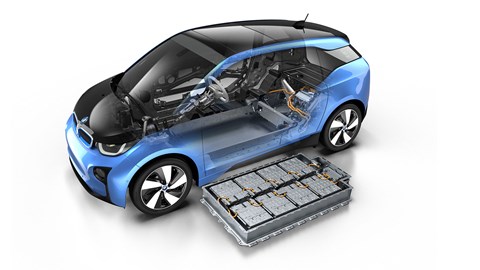
Dangers and envionmental impact
Electric car batteries are rigorously tested and manufacturers put plenty of safety systems in place to make sure they’re safe. If you’ve spent the last few years driving around with highly flammable petrol or diesel stored in your fuel tank, there’s really nothing to worry about.
Yes, there are very high voltages involved, but passengers will never be exposed to dangerous shocks, and in any case the batteries are typically protected from impacts by being packaged low down in the middle of the car to prevent them from being damaged in a crash, which could cause a fire.
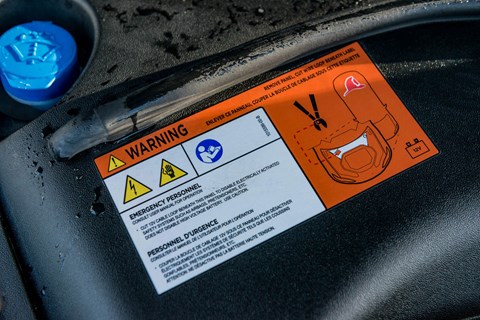
Environmental impacts? There are numerous studies suggesting that while an EV is more expensive to manufacture, it is in fact better for the environment over its whole lifecycle. And when an electric car reaches the end of the road, those valuable batteries can be removed and used to store energy – solar or off-peak mains-supplied – to power your home more efficiently. Smart energy supply systems are the next big thing, according to many industry watchers.
What is a solid state battery?
Solid state technology could represent the next big leap for electric cars, and it’ll be able to deliver considerably more range in a more compact package. Simply put, solid-state batteries use a solid electrolyte as opposed to the liquid or polymer gel one found in current lithium-ion batteries. This means a smaller footprint with less cooling requirements, and overall less space needed to package the powertrain than conventional battery tech. There’s a reason why most EV concepts back their insane ranges up with solid state tech.
Find out more about solid state tech here
The end of Lithium-ion?
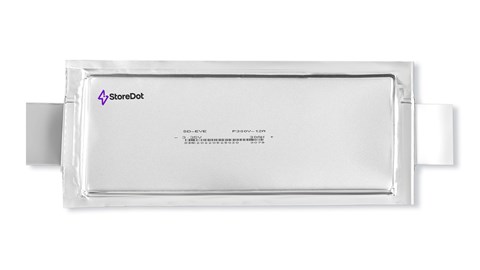
Not exactly. Although lithium-ion is fundamentally inferior as a technology when compared to solid state, it’s not out of the race just yet. Companies such as StoreDot have years of R&D experience with lithium-ion tech, and they’re still finding ways to stretch it further.
For example, StoreDot has recently revealed a new fast-charging technology which could allow for a rate of 100 miles for every 5 minutes of charge by 2024. Mass production is due in the same year, and with investors including Daimler, BP, Volvo and Polestar it could just keep lithium-ion in our EVs for years to come.
Further electric car reading
The fastest electric cars on sale today
Plug-in Car Grant: government incentives for EVs
Car tax for EVs: why you’ll save a bundle















![Toni Kroos là ai? [ sự thật về tiểu sử đầy đủ Toni Kroos ]](https://evbn.org/wp-content/uploads/New-Project-6635-1671934592.jpg)


